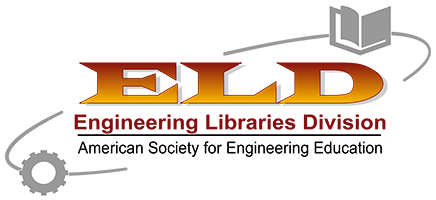The Best Poster Award recognizes the presenter(s) who display(s) a clear, well-organized poster that most effectively conveys the content of the poster.
Award History
Established 2006.
Criteria
- Single or multiple presenters are eligible.
- Presenters need not be members of ELD, but must be members of ASEE.
- Posters presented by Awards Committee members are ineligible during the members’ term of service.
- Poster must be presented during the ELD Poster Session time slot at the annual ASEE National Conference at which the award will be made.
Judging
Content
- Poster should be a solid, quality, complete piece of work.
- Poster should convey clearly and concisely the information to the reader.
- Poster should exhibit originality and be relevant to engineering librarianship.
Presentation
- Poster should be arranged in an organized and understandable form. The flow of the text and visuals should be easy to follow.
- Visual aids should enhance the understandability of the poster’s content.
- Handouts are encouraged and should explain, interpret, extend, and/or synthesize the content of the poster.
Presence
- Presenter(s) should be present to discuss the poster.
- Presenter(s) should show interest and enthusiasm in the poster’s content.
- Presenter(s) should communicate effectively the major points of the poster and answer questions about the poster’s content.
How to Nominate
All posters accepted for display at the ELD Poster Session during the ASEE annual conference are under consideration.
Award will be presented at the ELD Annual Meeting at the ASEE Annual Conference or, in the event the ELD Annual Meeting occurs prior to the ELD Poster Session, at the last ELD session prior to the ELD EEC Meeting.
Past Recipients
2024: “Developing a User Experience Study” (Work in Progress). James M. Cox and Kari Kozak, the University of Iowa
2023: “Exploring the Impact of Textbook Costs on Undergraduate Engineering Majors” Jentry E. Campbell and Stephen Krueger, Dartmouth University
2022: “Introducing Arduino Library Kits for Checkout.” James Thomas McAllister, University of Arkansas
2021: “The (Augmented) World is our Campus,” David S. Pixton and Jared Aaron Landetta, Brigham Young University
2020: No posters
2019: “The Great Coffee Hunt: An Augmented Reality Scavenger Hunt”, Kari Kozak (University of Iowa)
2018: “Engineering Graduate Student Information Literacy: Are We Meeting the Need?” Ms. Leena N Lalwani, Jamie M. Niehof, and Mr. Paul F. Grochowski (University of Michigan)
2017: A bibliometric analysis of ASEE conference papers published by members of the Engineering Library Division, by Nestor Osorio (Northern Illinois University) and Daniela Solomon (Case Western Reserve University).
2016: “Modification of the House of Quality to Assess Information Gaps during Quality Function Deployment of Engineering”, Chelsea Leachman and Jacob William Leachman (Washington State University).
2015: No posters submitted.
2014: Embedding Video-Based Learning Modules for Library Research Methods in an Online Graduate Engineering Program, Jeffery L. Loo (University of California, Berkeley), Lisa T.Ngo (University of California, Berkeley), Cody K. Hennesy (University of California, Berkeley), Brian D. Quigley (University of California, Berkeley), Jean McKenzie (University of California, Berkeley).
2013: Beyond JEE: Finding Publication Venues to Get Your Message to the ‘Right’ Audience, Amy Van Epps (Purdue University).
2012: No posters submitted.
2011: The Hybrid Reference Desk: Changing Strategies for Changing Times, Larry Thompson (Virginia Tech).
2010: An Analysis of ASEE-ELD Conference Proceedings: 2000-2009, David Hubbard.
2009: Assembling a Best Copy Archival Journal Collection: A Case Study of the University of California IEEE Project, Robert Heyer-Gray, Jean McKenzie, Lisa Ngo, Karen Andrews and Emily Stambaugh.
2008: SAE and Digital Rights (Mis)management or How to Marginalize Your Product, Alienate Your Customers, and Jeopardize Your Future (in Three Easy Steps), Larry Thompson.
2007: A New Paradigm for Assessing the Potential of a Digital Resource: The Paid Trail, Sasha Gurke and Lee Pedersen.
2006: Desperately Seeking Information: Where and Why Engineering Students Find the Information They Need, Theresa Barker, Julie Cook and Linda Whang (University of Washington).

